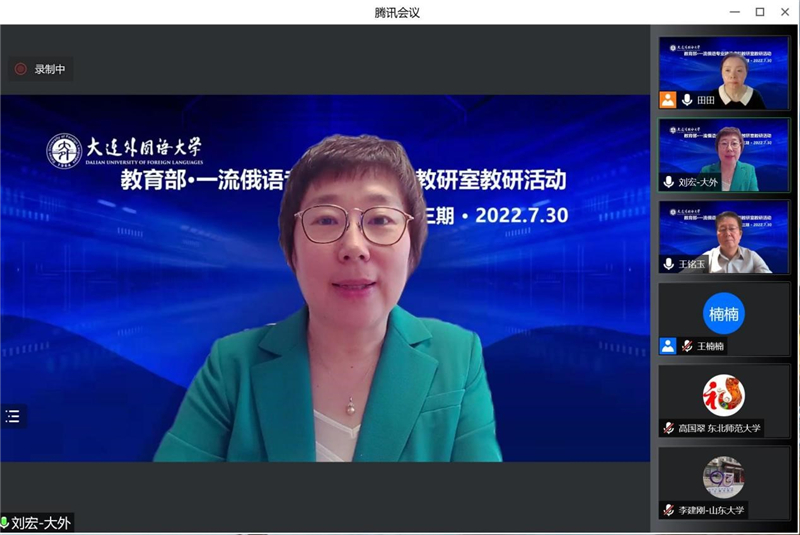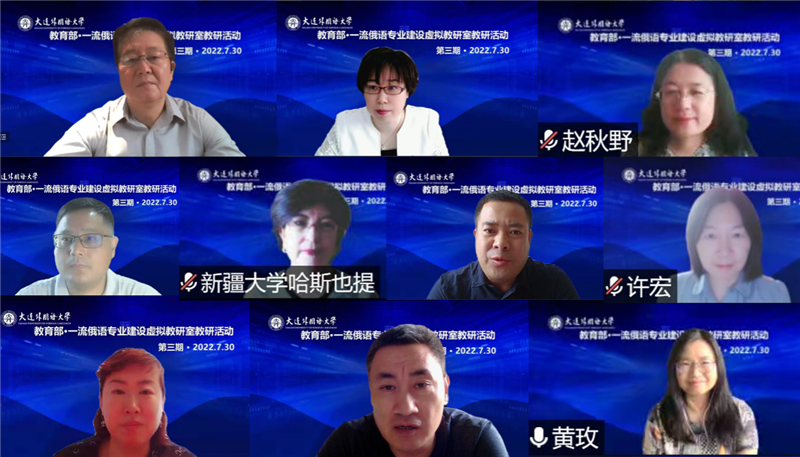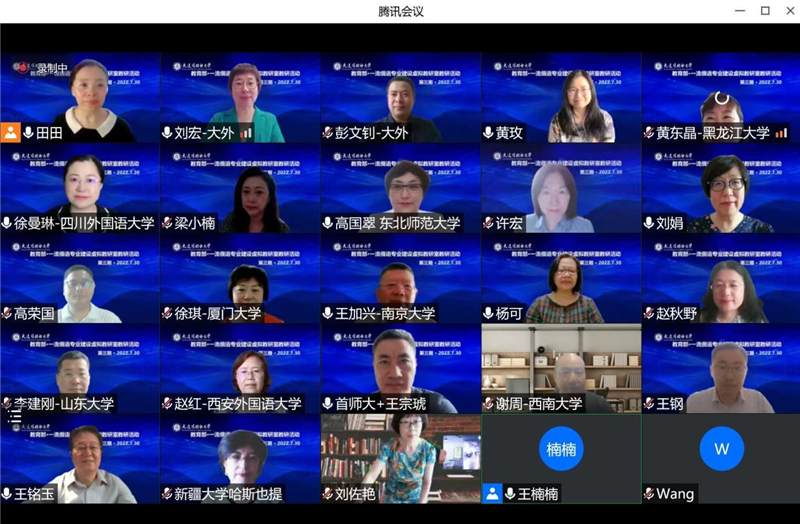The Virtual Teaching and Research Office of the Russian Language Department of the Ministry of Education held the third phase of teaching and research activities
On the morning of July 30th, the Virtual Teaching and Research Office of the Russian Language Major of the Ministry of Education of our school held the third phase of teaching and research activities. This period of teaching and research activities continues to conduct in-depth discussions on issues related to the construction of first-class Russian language majors, including: research and practice of Russian professional certification; Three years of success in the construction of first-class Russian language professionals; First-class Russian language professional construction personnel training. More than 150 people attended the teaching and research activities, including guest representatives of the members of the Virtual Teaching and Research Department of the Russian Language Department, all the teachers of the Russian Language Institute of our university and representatives of other sister universities.




Professor Liu Hong, Director of the Russian Language Subcommittee of the Foreign Guidance Committee of the Ministry of Education, Head of the Virtual Teaching and Research Department of the Russian Language Specialty, and President of Dalian University of Foreign Languages, delivered a speech. Professor Liu Hong, combined with the speech of Huai Jinpeng, Minister of Education, at the first counseling report meeting of education informatization and the speech of Fan Hailin, former deputy director of the Department of Higher Education, at the training meeting on the pilot construction of virtual teaching and research offices, stressed that the construction of virtual teaching and research offices for Russian majors also needs to achieve breakthroughs in the three aspects of digital development of higher education, the construction of grass-roots teaching organizations, and the improvement of teaching quality, and actively promote the virtual teaching and research departments of Russian majors to "explore new forms of teaching and research, build teaching and development communities, and jointly build high-quality teaching resource libraries".
Representatives of the member universities of the Virtual Teaching and Research Department of the Russian Language Major conducted the exchange and discussion of the third phase of teaching and research activities. Professor Wang Mingyu, former vice president of Tianjin University of Foreign Languages, a special guest of this issue of teaching and research activities, gave a detailed interpretation of the professional certification. Professor Wang Mingyu discussed his understanding of "Professional Certification" from four aspects: the origin and related concepts of professional certification, the professional certification of major foreign countries, the professional certification of Chinese undergraduate education majors, and the professional certification of humanities and social sciences and foreign language majors, among which the certification of Chinese undergraduate education majors, from the background, necessity, significance, characteristics, beginning, purpose, goal, essence, concept, element, principle, key, condition, level, category, characteristic, content, standard, stage, process, support, The 28 key points of the certification work of path, value, institution, expert, result and discipline were introduced and interpreted in detail, pointing out that professional certification is the last mile of quality assurance of talent training, and it is hoped that all institutions will attach great importance to it and make solid preparations for professional certification in combination with the construction of first-class Russian language majors.
Professor Li Yingying, Vice President of Tianjin Foreign Languages University, took the construction of first-class Russian language majors of Tianjin Foreign Languages University as an example, and shared the three-year results of the construction of first-class Russian language majors from five aspects: "Golden Lesson" planning, "Golden Master" construction, "Golden State" transformation, "Golden Talent" training and "Golden Material" design. Professor Zhao Qiuye of Harbin Normal University introduced the three-year achievements of the construction of first-class Russian language majors in Harbin Normal University from the aspects of teacher team building, talent training, and curriculum construction, and shared the practical experience of the reform of Russian (teacher training) professional curriculum, the second classroom activities, the two-wheel drive of scientific research and teaching, and the basic education service of the Ministry of Education. Professor Gao Rongguo of Hunan Normal University introduced the construction of first-class russian majors in normal colleges and universities, and discussed the multi-faceted thinking on the dilemma and solutions for the construction of first-class Russian majors in local normal colleges.
Associate Professor Hasyeti Hazi, head of the Russian language major construction of Xinjiang University, introduced the practice of Training Russian talents in Xinjiang University under the integration of industry and education based on historical evolution, professional characteristics, reform and development, joint training, and social practice, and put forward ideas for the future development of talent training. Professor Peng Wenzhao of Dalian University of Foreign Chinese, Professor Xu Hong of Shanghai University of Foreign Chinese, Professor Huang Dongjing of Heilongjiang University, Professor Wang Zonghu of Capital Normal University, and Professor Huang Mei of Beijing University of Foreign Chinese respectively made wonderful comments on the speeches of the above-mentioned special guests and keynote speakers.
Finally, Professor Liu Hong expressed her sincere thanks to all the speakers and summarized the teaching and research activities. Combined with the speeches of experts, Professor Liu Hong pointed out: First, the construction of first-class Russian language majors should be carried out in close connection with professional certification work; Second, the construction of first-class Russian majors should expand the pattern and vision, and should be combined with the construction of double-first-class schools and the construction of first-class majors in the country; Third, the construction of first-class Russian language majors should highlight the advantages of each institution, including geographical advantages, location advantages, and institutional type advantages; Fourth, the construction of first-class Russian-language majors should pay attention to the output of construction results, condense ideas, and reflect on problems in professional construction; Fifth, the construction of first-class Russian majors should extensively draw on the experience and advantages of non-foreign language professional construction, strengthen the support of non-foreign language majors for the construction of foreign language majors, and enhance the connotation and foundation of first-class foreign language professional construction.
The Virtual Teaching and Research Department of the Russian Language Major has successfully held two teaching and research activities on May 28th and July 2nd, 2022, and the third phase of teaching and research activities held this time provides a valuable exchange platform for our university and sister universities across the country to continue in-depth discussions and mutual learning on the construction of first-class Russian language majors. It is hoped that through the joint efforts of everyone, the virtual teaching and research office of Russian language majors will gradually become an exchange community and spiritual home for the majority of front-line Russian teachers, help improve the teaching, teaching and research and teaching and educating ability of Russian teachers, provide strong support for the high-quality development and digital development of Russian language education, and lay a solid foundation for improving the quality of Training of Russian professionals. (Nannan Wang)